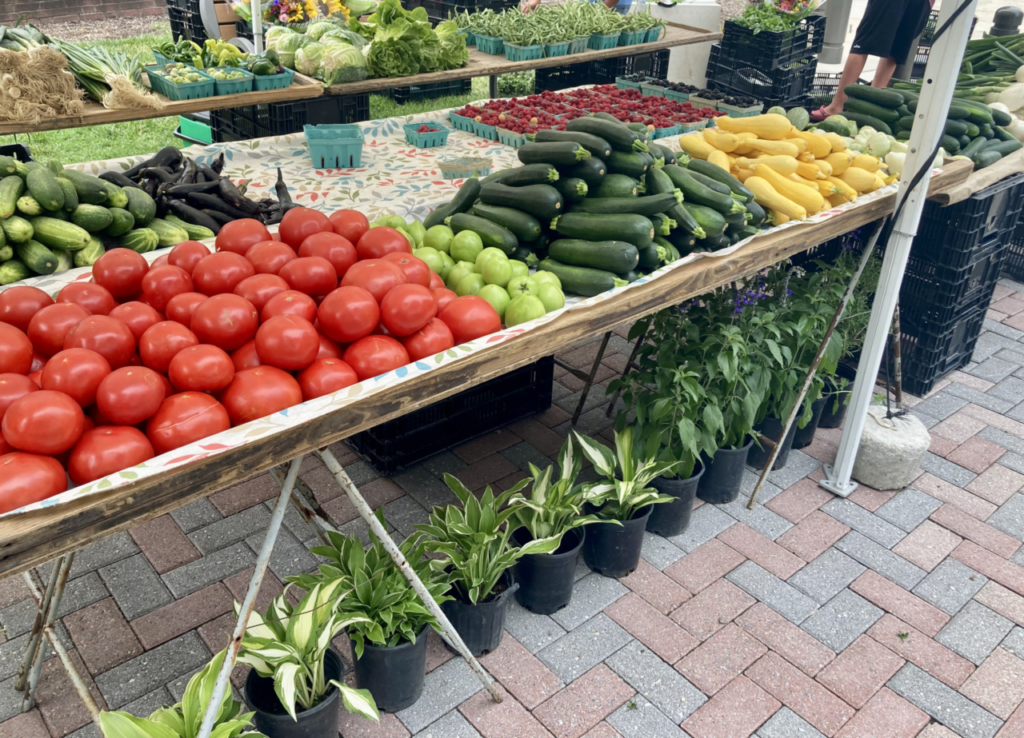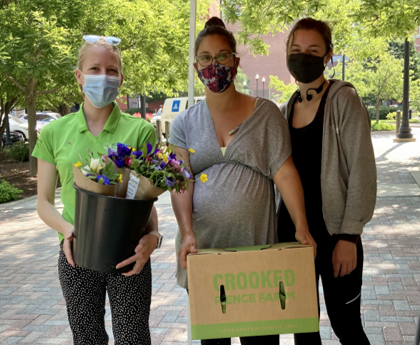10 Farmers Market Management Tips after 15 Years

A Farmers Market is one of the best ways to engage people within your organization and community in a sustainable way. Our team at Reduction In Motion has a decade of experience running farmers markets and wanted to share some of the lessons we learned over the years. We hope these tips will help you start, grow, or sustain your farmers’ market.
(1) Work with your local community
Farmers markets are best when they are a reflection of the local community. When you are selecting vendors keep the community in mind. Supporting local businesses will foster stronger relationships between all those who visit your market. Supporting local businesses is also better for the environment and community because less resources are required to transport goods. Money spent on local goods and services also me quickly and directly improves the livelihoods of those in the community.
(2) Start Small with your farmers market
One of the markets we’ve assisted with has been in operation for over 15 years, but it started with only a few vendors (some of which are still around today). It takes time to grow, and vendors will show interest once they see activity happening. As you work to grow your participation, your network of contacts and interested vendors will grow as well.
While you work to expand, be sure to utilize the available resources around you. There are organizations that help run farmers markets such as the Farmers Market Coalition (https://farmersmarketcoalition.org/). These organizations can help promote your market, and vendors within the local community which will help foster relationships, generate interest, and facilitate improved participation overall.
Get help starting a farmers market.
(3) Consider Vendor and Product Diversity
When considering who to invite or accept as a vendor, be sure to consider the range and types of products you wish to see at your market as well. Some markets have an explicit noncompete clause that does not allow certain products or competitive vendors to work in the same market. While you may not elect for this option, including a diversity of food or product types is important. Not only does this practice prevent concerns over selling competition, but it ensures that you keep things interesting for the customer base and offers a range of options to explore. Over the years, the markets we assist feature the typical produce, coffee, snacks, natural body products while also hosting variety of prepared foods ranging from soul food and pizza, Thai and Mexican, to smoothies and juices, and much more.
(4) Maintain Good Communication
Maintaining good communication with your vendors is the best way to ensure that your market is running as smoothly as possible. One important aspect of good communication is frequency. Connect with market vendors well and often enough that they are aware of any rules, reminded of any important changes, and feel comfortable asking questions. When questions or concerns do arise, it is also important to be as available and accommodating as you can. People are more receptive and willing to work with you the more you work with them. With this in mind, if you are not hearing from your vendors, it helps to check in periodically. They are the basis of the market so be sure to ask them their thoughts on the good or bad of their experience and make sure that any issues they share can be properly addressed, even if it is a help for future market seasons.
(5) Have a Farmers Market Manager

With all the things to factor in making decisions, this may be overlooked, but try to designate someone as the market manager. Though it may be a group effort to support the market and get it up and running, having one person designated to be there to answer questions and offer support is very valuable. It provides a clear point of contact for the vendors or marketgoers to answer questions, address issues, or collect information for later use.
(6) Be Flexible
One of the most effective ways of maintaining a harmonious farmers market is to be as flexible to changes as possible. When issues related to absences, parking, or changes in set-ups arise, accommodate as smoothly and quickly as possible. Often, there is a routine of spots and sales that develops so it makes the process easier but be open to changing the setup slightly to address gaps or placing an occasional canvasing table in an absent vendors spot on occasions when that makes sense.
While spontaneous changes may occur, it is also helpful to anticipate potential future needs as best as possible. Be prepared that some may not be able to participate for the whole season for a variety of reasons. If that is the case, it is good to keep a running list of interested vendors and those who could be potential backups as time goes on. You will always have individuals or companies reaching out with interest. Keeping a running list will help you when future need arises.
(7) Know your audience
While farmers’ markets are commonly a celebrated event, there are certainly different types and different needs depending on things like where it is located, who might stop by, when is it the busiest. Each market is unique based on the location and the targeted audience. There are the quintessential large weekend markets, lunch-time markets, or markets targeting evening commuters… just pick the one that is a best fit for you.
We work specifically on a hospital and university campus. Therefore, we cater mostly to staff of the hospital and students specifically during lunchtime. Therefore, we plan to have the market during lunch hours and prioritize lunchtime food options. We work to tailor the market to this general setup and look for their feedback to accommodate their wishes as much as possible. We hope to support a symbiotic relationship in which the marketgoers are happy to return to the market and the vendors are happy with the interest in their products (and therefore sales).
(8) Be open to feedback but…
…you can’t accommodate everyone. While it is important to be flexible and accommodating to ameliorate issues, it is impossible to meet every possible comment that people bring to you. Participants and vendors will appreciate your willingness to accept feedback and will share concerns. However, not all criticisms are feasible. Do the best you can with the resources at your disposal.
(9) Stay organized
Organization is key. Planning and maintaining pertinent information are helpful for preparation, but those items will be useful throughout the run of the market as well. We recommend keeping information in one place accessible to any staff or volunteers assisting with market operations. There is a binder and shared online drive that our team uses that houses information from previous years, the season schedule and market vendor attendance (for example, some vendors alternate every other week or may be unable to attend a few markets due to personal reasons), a FAQ sheet, and a map with general locations of the vendors. This has been a big help to close out the season and start preparing for the next!
(10) Don’t forget about marketing your farmers market
While you might assume that a farmers’ market would have its own draw just by virtue of being a market, there are always ways to improve participation and marketing is an essential part. One of the more obvious tools at your disposal is social media. Alongside this, utilize the resources and contacts that you also have at your disposal. This might include company-wide all-user emails, promotion through community calendars, highlights in local publications, posters, flyers and event QR Codes.
With time, you can also add events at the market for added promotion. Try hosting cooking demonstrations featuring seasonal produce, giveaways such as offering reusable bags for the first 50 market shoppers, coordinating community paper shredding events, and designate a space for non-profit organizations to organize tabling events. These keep the market interesting and might catch the eye of someone who otherwise may not have known of the market!

Our team of sustainability and waste consultants work together to develop content for our site. Contact us to learn more about something we’ve written about or would like us to focus on in the future.

